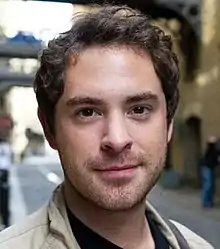Brian Earp
Brian David Earp is an American bioethicist, philosopher, and interdisciplinary researcher. He is currently Associate Director of the Yale-Hastings Program in Ethics and Health Policy at Yale University and The Hastings Center, and a Research Fellow in the Uehiro Centre for Practical Ethics at the University of Oxford. Earp has written (frequently in collaboration with others) on a wide range of topics, including free will,[1] sex and gender[2] and the replication crisis in psychology[3] He currently writes the quarterly "Philosophy in the Real World" column for The Philosopher. In 2019, Earp wrote his first book (co-written with Julian Savulescu), published in the UK as Love Is the Drug: The Chemical Future of Our Relationships [4] and in the United States as Love Drugs: The Chemical Future of Relationships). [5][6][7][8][9]

Early life
Earp grew up in a conservative Christian household. His mother was a stay-at-home mother; his father was a X-ray technician.[8]
Work and views
Relationships and drugs
He is best known for writing Love Is the Drug: The Chemical Future of Our Relationships with Julian Savulescu.[8][10][11][12] He has argued that certain forms of medications can be ethically consumed as a "helpful complement" in relationships. Both to fall in love, and, to fall out of it.[8][9]
Circumcision
Earp has argued that all forms of involuntary non-therapeutic genital cutting — in which category he includes routine neonatal circumcision, intersex interventions, and female genital mutilation — are violations of bioethical principles.[13][14][15][16] He has written multiple papers and articles on the history of circumcision: arguing that the desire to control male sexuality is "evident both in Judaism and in the Victorian period."[13] For this work, Earp was nominated for the 2020 John Maddox Prize, and received commendation from the judges, for “taking a multi-disciplined, science-based approach to a deep-rooted cultural practice”. [17]
References
- psyarxiv.com https://psyarxiv.com/3bxra. Retrieved 2020-12-07. Missing or empty
|title=(help) - "What is Gender For?" (PDF).
- Earp, Brian D.; Trafimow, David (2015). "Replication, falsification, and the crisis of confidence in social psychology". Frontiers in Psychology. 6. doi:10.3389/fpsyg.2015.00621. ISSN 1664-1078.
- "Manchester University Press - Love is the Drug". Manchester University Press. Retrieved 2020-12-07.
- Press, Stanford University. "Love Drugs: The Chemical Future of Relationships | Brian D. Earp and Julian Savulescu". www.sup.org. Retrieved 2020-12-07.
- Greenberg, Jon (April 18, 2016). "HIV In Africa: 6 Million Circumcisions And Counting". Politifact. Retrieved 2020-10-25.
- Zublin, Fiona (2020-01-05). "Love in the Roaring '20s". OZY. Retrieved 2020-10-25.
- Shane, Cari (2019-12-12). "Can We Replace Couples Therapy With Real-Life Love Potions?". OZY. Retrieved 2020-10-25.
- Szalavitz, Maia (2014-05-19). "Is It Possible to Create an Anti-Love Drug?". The Cut. Retrieved 2020-10-29.
- Fetters, Ashley (2020-01-16). "Your Chemical Romance". The Atlantic. Retrieved 2020-10-25.
- Anekwe, Lilian. "Drugs may be able to fix our romantic lives when things go wrong". New Scientist. Retrieved 2020-10-25.
- Anekwe, Lilian (February 12, 2020). "Drugs may be able to fix our romantic lives when things go wrong". New Scientist. Retrieved 2020-10-29.
- Hacker, Daphna (2017). Legalized Families in the Era of Bordered Globalization. Cambridge University Press. pp. 270–271. ISBN 978-1316508213.
- Earp, Brian (October 2015). "Female genital mutilation and male circumcision: toward an autonomy-based ethical framework". Medicolegal and Bioethics: 89. doi:10.2147/mb.s63709. ISSN 2230-2468.
- Earp, Brian D.; Steinfeld, Rebecca (May 15, 2017). "How different are female, male and intersex genital cutting?". The Conversation. Retrieved October 29, 2020.
- Shweder, Richard A. (2016). "Equality Now in Genital Reshaping: Brian Earp's Search for Moral Consistency". Kennedy Institute of Ethics Journal. 26 (2): 145–154. doi:10.1353/ken.2016.0016. ISSN 1086-3249.
- CAPRISA (Dec 14, 2020). "Anthony Fauci and Salim Abdool Karim jointly awarded John Maddox Prize 2020 for standing up for science during the coronavirus pandemic".